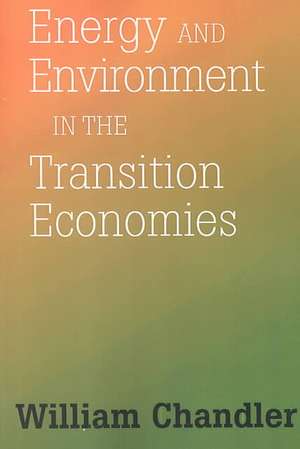Energy And Environment In The Transition Economies: Between Cold War And Global Warming
Autor William Chandleren Limba Engleză Paperback – 22 sep 2000
| Toate formatele și edițiile | Preț | Express |
|---|---|---|
| Paperback (1) | 411.42 lei 6-8 săpt. | |
| Taylor & Francis – 22 sep 2000 | 411.42 lei 6-8 săpt. | |
| Hardback (1) | 1000.27 lei 6-8 săpt. | |
| Taylor & Francis – 13 iun 2019 | 1000.27 lei 6-8 săpt. |
Preț: 411.42 lei
Nou
Puncte Express: 617
Preț estimativ în valută:
78.75€ • 85.57$ • 66.19£
78.75€ • 85.57$ • 66.19£
Carte tipărită la comandă
Livrare economică 21 aprilie-05 mai
Preluare comenzi: 021 569.72.76
Specificații
ISBN-13: 9780813338125
ISBN-10: 0813338123
Pagini: 248
Ilustrații: black & white illustrations
Dimensiuni: 152 x 229 x 15 mm
Greutate: 0.34 kg
Ediția:New.
Editura: Taylor & Francis
Colecția Routledge
Locul publicării:Oxford, United Kingdom
ISBN-10: 0813338123
Pagini: 248
Ilustrații: black & white illustrations
Dimensiuni: 152 x 229 x 15 mm
Greutate: 0.34 kg
Ediția:New.
Editura: Taylor & Francis
Colecția Routledge
Locul publicării:Oxford, United Kingdom
Cuprins
* List of Illustrations * Preface * List of Acronyms * 1. Energy and Change * At Stake * After the Fall * Reform and Energy Intensity * Conclusions * 2. End-Use Efficiency * Buildings * Industry * Transportation * Technology Cost Analysis * Poland * Czech Republic * Russia * Ukraine * Other Countries * Frontier Financing * Conclusions * 3. Nuclear Safety and Security * Soviet Reactor Technology * Aiding Nuclear Power * Civilian Nuclear Security and the Military * Conclusions * 4. Petroleum Geoeconomics * Shifting Caspian Fortunes * The Caspian * Russian Gas * Pipeline Geopolitics * Reform * Environment * Conclusions * 5. Coal and Reform * Coal's Decline * Mining Technology * Coal Pollution * Reform * Conclusions * 6. Utility Monopoly and Competition * Highly Charged Reform * District Heating * Advanced Power Technology and Generation * Conclusions * 7. Environmental and Climatic Change * Elements of Climate Change * The Euro-Siberian Climate * Energy Projections, Climate Forecasts * Beyond Kyoto * Conclusions * 8. The Second Generation of Reform * End of the Beginning * Reforming Aid to Reform * The Next Generation * Appendix * Index
Descriere
Energy and environmental issues in the former Soviet sphere rank as global policy priorities for three reasons. First, civilian application of military nuclear materials multiplies the threat of terrorism. Second, Russian and Caspian oil resources affect world markets, Western energy security, and regional stability. Third, climate change may become a global challenge commensurate with the Cold War, and the transition economies--the former Soviet Union and Eastern Europe--offer the world's largest and cheapest near-term opportunities for curbing greenhouse gas emissions. Yet, the region remains unprepared to deal with these issues, and Western assistance has failed to help. A "second generation" of reform efforts is needed, led from within, but supported by the West. In Energy and Environmental Policies in the Transition Economies William Chandler synthesizes disparate, specialized analyses and publications. He draws on a relatively large body of research on energy technology, oil and gas markets, geopolitics, finance, economic reform, and environmental science specific to Russia, eastern Europe, and the transition economies. In successive chapters Chandler reviews energy use, energy efficiency, nuclear safety and security, petroleum geoeconomics, coal, utility monopoly and competition, and environmental and climatic change in the former Soviet Union and Central and Eastern Europe. Chandler also considers options for a "second generation" of reform efforts. The subject matter of the book is significant not only for the energy and environmental policies themselves, important though they are, but because those policies in turn affect regional political stability and Western energy security. Energy and Environmental Policies in the Transition Economies will be of considerable interest to policymakers in government, to private-sector actors, to academic scholars, and to students of international energy and environmental politics.









